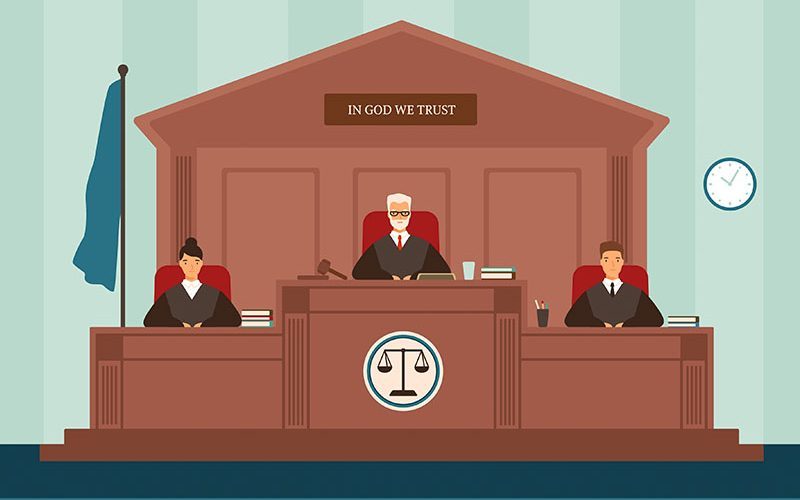If you’ve been arrested and charged with a crime, you likely have questions and concerns about what happens next. There are countless criminal offenses, and each can lead a defendant in various ways depending on the case’s circumstances. Overall, the criminal defense process moves in a general direction for the majority of offenses in most states. Keep reading to learn more about the criminal defense process.
What is a defense attorney?
A defense attorney is a lawyer that represents someone who faces criminal charges. Defense attorneys typically begin supporting a defendant immediately after an arrest or when criminal charges are filed. It’s wise to contact a criminal defense lawyer as soon as possible after an arrest so they can begin building a defense strategy.
Defense attorneys provide assistance in several ways. They can investigate the criminal case with a fresh set of eyes, identify new evidence, or locate potential witnesses. They often have excellent negotiating skills, giving defendants new options that go beyond the penalties set by a judge.
A defense attorney can also help a defendant prepare for court proceedings, counsel them on what to say, and offer general support throughout a case. Overall, a criminal defense attorney aims to produce the best possible outcome for a person charged with a crime.
What are felonies, misdemeanors, and infractions?
Felonies, misdemeanors, and infractions are the terms used to classify crimes and violations in most states. Felonies are the most serious crimes and typically result in penalties that go beyond one year in jail. A felony can also lead to expensive fines, community service, probation, and other consequences.
Misdemeanors are less severe than felonies but more serious than infractions. A misdemeanor doesn’t always lead to jail time, but when it does, the length of a jail sentence is generally less than a year in most states.
Infractions are the least serious, and they don’t always result in a criminal charge. In some states, an infraction can be handled in a civil court. It can be the equivalent of getting a parking ticket. Most infractions can be settled by paying a fine and rarely involve jail time.
What happens after you are charged with a crime?
Those charged with criminal offenses can end up in police custody in many different ways. You may have been arrested by an officer who had probable cause that you committed a crime. Or, there may be a warrant out for your arrest, and you turned yourself in to the police.
Upon being detained by the police, you’ll go through a booking procedure. Law enforcement will record your name, take fingerprints, and obtain other vital information. You’ll be held in custody until your arraignment hearing, which typically takes place within 48-72 hours after your arrest.
What is a plea bargain?
A plea bargain is an agreement that takes place between the prosecution and the defense. If both parties can reach a plea bargain, the criminal case will not go to trial. Plea bargains can go in several directions, but it will all depend on the case’s circumstances.
For instance, a defense attorney may reach a compromise that includes a lesser sentence for the defendant if they can provide valuable information regarding an ongoing criminal investigation. If the prosecutor doesn’t believe their evidence is strong, they might be able to minimize the penalties to provide a consequence while avoiding a trial.
Can a case be dismissed?
If there’s a lack of evidence or strong evidence proving innocence, cases can be dismissed. For example, a criminal defense lawyer can fight for dismissal if there’s clear proof that the defendant wasn’t present when a crime occurred.
How does a criminal case go through the justice system?
Here’s how a criminal case moves through the justice system:
Criminal Investigation and Arrest
Every criminal case begins with an investigation. If there’s probable cause pointing to a crime and a suspect, law enforcement will make an arrest.
Police Custody and Booking
A defendant begins at the local police station, where they will be booked and held until their arraignment hearing.
Arraignment Hearing
Three key things happen at an arraignment hearing. First, a judge charges the defendant and cites their criminal offenses. Then, a defendant will enter a plea of not guilty, guilty, or nolo contendere, which means they’re accepting a conviction without admitting guilt. Lastly, the conditions of bail are set. A defendant may be released without bail or have to meet the bail terms to be released.
Pre-trial Phase
The pre-trial phase is when the defense and the prosecution take the time to decide what happens next. During this time, either attorney may file motions to request something in a case. Both sides will review evidence, interview witnesses, and each party will assess the strength of their case.
After the pre-trial phase closes, the case can move in three different directions:
Plea Bargain
The defense and the prosecution reach an agreement on the consequences for the defendant. The defendant might accept some form of responsibility or provide valuable information in exchange for a lesser sentence.
Dismissed
A case is dismissed, and the defendant is released from custody.
Trial
The case goes to trial. Both sides prepare evidence, witnesses, and arguments. A judge or a judge and jury will decide on the verdict. If a jury can’t reach a unanimous verdict, it’s referred to as a mistrial. A mistrial allows the prosecution to try the case over again.
The Criminal Defense Process: Key Takeaways
The criminal defense process can be exhausting and complicated. Some cases move quickly through the justice system, while others can take months or even years. After an arrest, a defendant should contact a criminal defense attorney as soon as possible or request a public defender.
Regardless of the extent of the charges, every individual charged with a crime has the right to legal representation. A defense lawyer can help investigate the case, identify new evidence, and provide the defendant with general support.
It’s never recommended to speak to police without a criminal defense attorney present.

